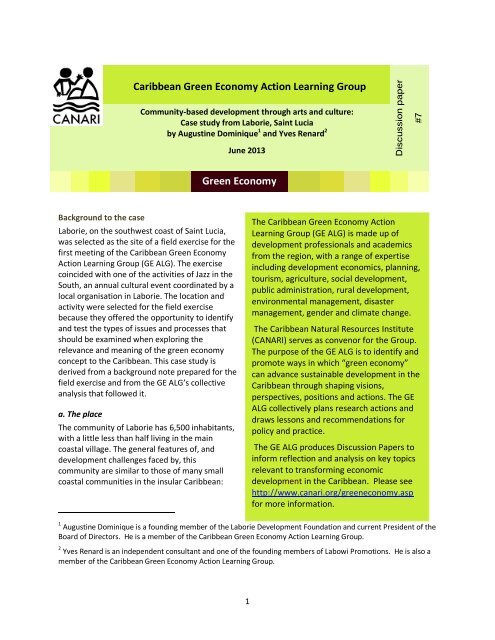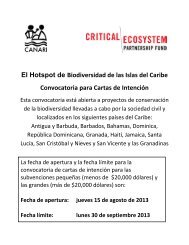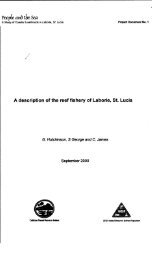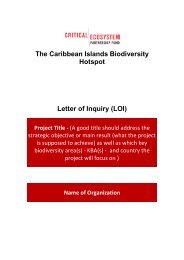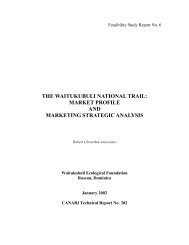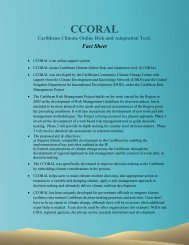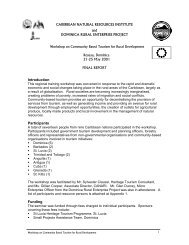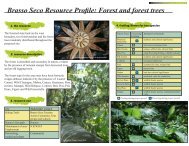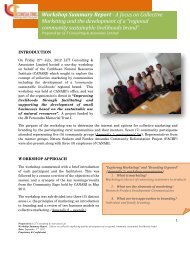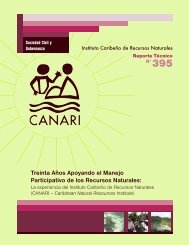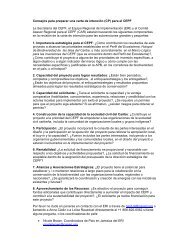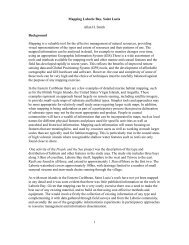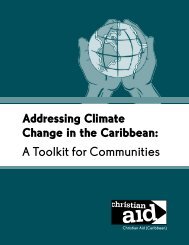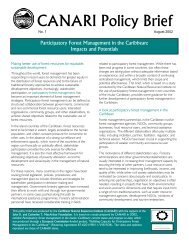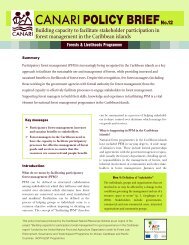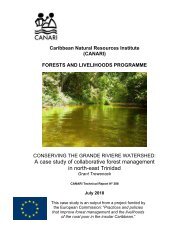Case study from Laborie Saint Lucia - CANARI
Case study from Laborie Saint Lucia - CANARI
Case study from Laborie Saint Lucia - CANARI
You also want an ePaper? Increase the reach of your titles
YUMPU automatically turns print PDFs into web optimized ePapers that Google loves.
Caribbean Green Economy Action Learning Group<br />
Community-based development through arts and culture:<br />
<strong>Case</strong> <strong>study</strong> <strong>from</strong> <strong>Laborie</strong>, <strong>Saint</strong> <strong>Lucia</strong><br />
by Augustine Dominique 1 and Yves Renard 2<br />
June 2013<br />
Discussion paper<br />
#7<br />
1 2<br />
Green Economy<br />
Background to the case<br />
<strong>Laborie</strong>, on the southwest coast of <strong>Saint</strong> <strong>Lucia</strong>,<br />
was selected as the site of a field exercise for the<br />
first meeting of the Caribbean Green Economy<br />
Action Learning Group (GE ALG). The exercise<br />
coincided with one of the activities of Jazz in the<br />
South, an annual cultural event coordinated by a<br />
local organisation in <strong>Laborie</strong>. The location and<br />
activity were selected for the field exercise<br />
because they offered the opportunity to identify<br />
and test the types of issues and processes that<br />
should be examined when exploring the<br />
relevance and meaning of the green economy<br />
concept to the Caribbean. This case <strong>study</strong> is<br />
derived <strong>from</strong> a background note prepared for the<br />
field exercise and <strong>from</strong> the GE ALG’s collective<br />
analysis that followed it.<br />
a. The place<br />
The community of <strong>Laborie</strong> has 6,500 inhabitants,<br />
with a little less than half living in the main<br />
coastal village. The general features of, and<br />
development challenges faced by, this<br />
community are similar to those of many small<br />
coastal communities in the insular Caribbean:<br />
The Caribbean Green Economy Action<br />
Learning Group (GE ALG) is made up of<br />
development professionals and academics<br />
<strong>from</strong> the region, with a range of expertise<br />
including development economics, planning,<br />
tourism, agriculture, social development,<br />
public administration, rural development,<br />
environmental management, disaster<br />
management, gender and climate change.<br />
The Caribbean Natural Resources Institute<br />
(<strong>CANARI</strong>) serves as convenor for the Group.<br />
The purpose of the GE ALG is to identify and<br />
promote ways in which “green economy”<br />
can advance sustainable development in the<br />
Caribbean through shaping visions,<br />
perspectives, positions and actions. The GE<br />
ALG collectively plans research actions and<br />
draws lessons and recommendations for<br />
policy and practice.<br />
The GE ALG produces Discussion Papers to<br />
inform reflection and analysis on key topics<br />
relevant to transforming economic<br />
development in the Caribbean. Please see<br />
http://www.canari.org/greeneconomy.asp<br />
for more information.<br />
1 Augustine Dominique is a founding member of the <strong>Laborie</strong> Development Foundation and current President of the<br />
Board of Directors. He is a member of the Caribbean Green Economy Action Learning Group.<br />
2 Yves Renard is an independent consultant and one of the founding members of Labowi Promotions. He is also a<br />
member of the Caribbean Green Economy Action Learning Group.<br />
1
1. Mixed economy (agriculture, fishing,<br />
commercial sector), with farming and<br />
fishing continuing to be the primary<br />
economic activities of the inhabitants.<br />
2. A natural resource base that supports<br />
traditional economic sectors (agriculture,<br />
fishing), offers potential for diversification<br />
(creative goods based on biodiversity,<br />
tourism), and is under threat (coastal<br />
pollution).<br />
3. Vulnerability to disasters, increased by<br />
climate change and degradation of the<br />
coastal environment (loss of coastal<br />
protection).<br />
4. Negative impacts of trade liberalisation on<br />
farming with economic and social<br />
consequences (poverty, migration, security<br />
issues). The main cash crop (bananas) has<br />
declined greatly in recent years as a result<br />
of the loss of preferential access to<br />
European markets, causing drastic<br />
reductions in production and export.<br />
5. Unfulfilled tourism promises such as hotel<br />
developments that have not materialised.<br />
6. Geographic marginalisation: although <strong>Saint</strong><br />
<strong>Lucia</strong> is small, much of the economic activity<br />
centres on the north of the island, and<br />
current development initiatives and trends<br />
tend to exacerbate geographic disparities.<br />
Perhaps one of the distinctive features of this<br />
community is that it has significant social<br />
capital, with strong community institutions,<br />
including a vibrant Co-operative Credit Union<br />
that has been in existence since 1976. With<br />
1200 members and assets of around US$30<br />
million, it is currently the leading community<br />
financial institution in <strong>Saint</strong> <strong>Lucia</strong>. It provides<br />
employment and all main banking services,<br />
including education, housing and business<br />
loans.<br />
b. Community-based development planning<br />
In 1999 a small group of local residents and<br />
organisations with an interest in sustainable<br />
development and dissatisfied with conventional<br />
development approaches, took the initiative to<br />
facilitate the participatory formulation of a<br />
Strategic Development Plan for <strong>Laborie</strong>. The<br />
decision was made in response to a government<br />
programme, known as Comfort 2000, which<br />
aimed at supporting community-based projects<br />
in all towns and villages in the country. Financial<br />
and technical assistance was sought and<br />
received <strong>from</strong> the <strong>Saint</strong> <strong>Lucia</strong> Heritage Tourism<br />
Programme for a process that involved two<br />
years of consultations and studies aimed at<br />
identifying issues and opportunities for the<br />
integrated development of the <strong>Laborie</strong> village<br />
and surrounding communities. An ad hoc<br />
<strong>Laborie</strong> Development Planning Committee<br />
(approximately 25 people, representative of all<br />
main sectors and social groups) coordinated this<br />
participatory planning process. The plan was<br />
finalised and published in December 2001.<br />
The plan offered the vision of “a culturally<br />
vibrant community where there is continuous<br />
improvement in the quality of life and where<br />
people are able to enjoy all the basic necessities<br />
and to participate fully in the process of<br />
development”. The plan is structured along<br />
several strategic directions, including:<br />
participation; uniqueness and competitiveness;<br />
economic linkages and integration;<br />
encouragement of self-help, autonomy and<br />
initiative; strengthening of community<br />
organisations; and cultural development, and it<br />
includes five sectoral plans (education and<br />
human resources; health care and social<br />
services; agriculture and fishing; tourism; and<br />
youth and sports).<br />
At the end of this process and in accordance<br />
with the provisions of the strategic plan, a new<br />
institution, the <strong>Laborie</strong> Development<br />
Foundation, was established, building on the<br />
experience of the <strong>Laborie</strong> Development<br />
Planning Committee, as the primary<br />
institutional arrangement for the coordination<br />
of the implementation of the strategic plan. The<br />
Foundation was formally registered in<br />
December 2002 as a not-for-profit company. Its<br />
members are community organisations that<br />
have a primary focus on <strong>Laborie</strong>. At present,<br />
2
there are 10 organisational members. The<br />
Foundation aims to serve three roles in the<br />
community:<br />
• as an organisation that promotes and<br />
supports the social and economic<br />
development of the community, while<br />
facilitating the participation of all groups in<br />
the development process;<br />
• as a research-based planning agency that<br />
works with but independently <strong>from</strong><br />
government to achieve sustainable<br />
development of the community and<br />
improve quality of life for the people of<br />
<strong>Laborie</strong>;<br />
• as a federation of community<br />
organisations.<br />
The Foundation defines its vision as Yon<br />
konmin, Yon katjil, Yon mouvman pou<br />
divèlòpman (one community, collective thought<br />
and action, for [sustainable] development).<br />
Since it was established, it has achieved a strong<br />
track record for its ability to mobilise and bring<br />
together the community and to provide a<br />
neutral arena for political dialogue on<br />
development challenges. It has also influenced<br />
national policy, secured funding for social,<br />
environmental and economic projects, and<br />
networked effectively with other organisations<br />
both locally and regionally (for example, LDF<br />
was the main driver behind the twinning of<br />
<strong>Laborie</strong> and Anses d’Arlets, Martinique).<br />
c. Labowi Promotions<br />
One of the members of the Foundation is<br />
Labowi Promotions, a not-for-profit communitybased<br />
cultural organisation created in 1991. Its<br />
mission is “to enhance social togetherness and<br />
harmony and to promote economic<br />
development in <strong>Laborie</strong>, in surrounding<br />
communities and in <strong>Saint</strong> <strong>Lucia</strong> as a whole,<br />
through cultural and artistic events and<br />
expression”. It is a volunteer organisation, run<br />
by a small group of cultural activists, with<br />
minimal administrative and coordination costs,<br />
and with funding coming <strong>from</strong> private and<br />
public sector grants to sponsor events and<br />
activities, and <strong>from</strong> the rental of equipment.<br />
Labowi Promotions’ work is based on the<br />
assumption that arts and culture can and should<br />
be: (a) vehicles of economic development and<br />
social cohesion as well as cultural integrity and<br />
identity at community level, (b) instruments of<br />
economic growth, livelihood enhancement and<br />
job creation at local and national levels, and (c)<br />
avenues for mutual understanding,<br />
collaboration and shared identity at the regional<br />
level. The organisation also believes that there<br />
are forms of cultural and artistic expression,<br />
such as Creole Jazz, that have a particularly<br />
important role to play in realising this vision,<br />
because they are accessible to all social groups,<br />
they link tradition and modernity, and they are<br />
at the heart of Caribbean identity.<br />
Since its creation, Labowi Promotions has<br />
organised more than 300 events and activities,<br />
in music, education, dance, drama and visual<br />
arts. Its main production is a festival known as<br />
Jazz in the South, an autonomous component of<br />
the <strong>Saint</strong> <strong>Lucia</strong> Jazz and Arts Festival. Other<br />
regular events include the celebration of<br />
Emancipation and participation in Nobel<br />
Laureate Week. Among the group’s ongoing<br />
activities is the facilitation of the <strong>Laborie</strong> Pan<br />
Project, started in 2006 with support <strong>from</strong> two<br />
national organisations, the Cultural<br />
Development Foundation and the Poverty<br />
Reduction Fund. It is a community steel band<br />
directed primarily at children and young adults,<br />
with a vision to provide a range of social,<br />
economic and cultural benefits to its<br />
participants.<br />
d. Jazz in the South<br />
Jazz in the South started in 1997, and it has<br />
established itself as a Festival in its own right,<br />
with the objectives of promoting Caribbean<br />
music and musicians and supporting economic<br />
activity, business opportunities and social<br />
cohesion in host communities. Since its<br />
creation, it has featured over 150 bands <strong>from</strong> all<br />
over the Caribbean, with performers <strong>from</strong> many<br />
countries in the region, including Antigua and<br />
3
Barbuda, Barbados, Cuba, Dominica, the<br />
Dominican Republic, Guadeloupe, French<br />
Guiana, Haiti, Jamaica, Martinique, <strong>Saint</strong> <strong>Lucia</strong>,<br />
and Trinidad and Tobago, and with guests <strong>from</strong><br />
Africa.<br />
While the Festival is indeed above all a cultural<br />
event, it is also an instrument of community<br />
development, as community festivals are also<br />
good for the local economy. In the past few<br />
years, for example, two surveys of local vendors<br />
have been carried out in the South of the island,<br />
and they have both indicated that vendors <strong>from</strong><br />
<strong>Laborie</strong> place Jazz in the South as their most<br />
important activity in terms of revenue. And it is<br />
not only the vendors who benefit, especially<br />
since Labowi Promotions ensures that all the<br />
services needed are provided locally when<br />
available. An event like Jazz in the South<br />
therefore means business opportunities for<br />
vendors, but it also means additional income for<br />
taxi drivers, restaurants, caterers and hotels in<br />
the area, and many others.<br />
At a broader level, Jazz in the South contributes<br />
to the community’s efforts to promote itself as<br />
a heritage tourism destination by creating<br />
opportunities for relaxed interaction between<br />
local people and visitors; promoting local<br />
cuisine, food products and crafts; and<br />
showcasing traditional <strong>Saint</strong> <strong>Lucia</strong>n village life<br />
and culture.<br />
Other features of Jazz in the South that may be<br />
relevant to a green economy agenda include:<br />
• efforts to minimise environmental impacts;<br />
• the facilitation of original collaborations and<br />
projects between musicians <strong>from</strong> different<br />
parts of the Caribbean region and the<br />
diasporas;<br />
• the provision of public relations and<br />
marketing support to musicians;<br />
• support in 2013 to an original Jazz and<br />
Enacted Word project on the topic of<br />
environment and climate change;<br />
• dissemination of environmental messages<br />
at mass events.<br />
Development issues in <strong>Laborie</strong><br />
Despite this picture of a culturally and socially<br />
vibrant community supported by strong local<br />
institutions, <strong>Laborie</strong> has been affected badly by<br />
larger economic forces over the last few years,<br />
particularly the end of a preferential market for<br />
bananas and the enduring global recession.<br />
Employment opportunities are limited to a few<br />
small businesses and industries in the area.<br />
Many residents work in other towns, some<br />
commuting long distances to the north of the<br />
island. There is a general recognition amongst<br />
all residents that the local economy needs to be<br />
transformed, to create the conditions to attract<br />
and sustain more initiatives like Jazz in the<br />
South. The Foundation believes that tourism<br />
based on the uniqueness and quality of the<br />
community’s cultural and natural assets can<br />
drive such a transformation. The key<br />
characteristics of the community’s current<br />
development vision include:<br />
• local ownership and use of local economic,<br />
environmental and cultural assets;<br />
• local products that are authentic and<br />
vibrant, and that present a unique<br />
experience;<br />
• benefits to the whole community;<br />
• locally available (and largely locally owned)<br />
accommodation;<br />
• competitiveness;<br />
• attention to quality and standards.<br />
In pursuit of this vision, the Foundation has<br />
worked to develop a calendar of local events<br />
and a community folk band. Work has also<br />
been ongoing on the development of a local<br />
bed and breakfast accommodation sector, a<br />
necessary component for increased benefits of<br />
the tourism product.<br />
Challenges and questions for further action<br />
research<br />
The Foundation’s diagnostic of challenges<br />
identifies the following issues:<br />
• developing an effective and credible<br />
4
framework for participatory governance in<br />
which the roles of local and national<br />
government agencies and community<br />
institutions are complementary and<br />
mutually supportive;<br />
• acceptance, both by the local population<br />
and national stakeholders, of the possibility<br />
of alternative models of community<br />
governance and local economic<br />
development;<br />
• financing for implementation;<br />
• managing and responding to social and<br />
economic changes in the community;<br />
• sustainability of community institutions,<br />
especially given these changing contexts.<br />
Some of the deeper challenges identified by the<br />
GE ALG during its Jazz in the South field exercise<br />
revolved around balancing the local social and<br />
cultural benefits of the community’s approach<br />
to development with the imperative of<br />
economic viability, which requires attracting<br />
increased “spending power” into the<br />
community. Questions raised by the Group<br />
included:<br />
• How can <strong>Laborie</strong> achieve its objective of<br />
local ownership while tapping into the<br />
larger, and largely vertically integrated,<br />
national tourism sector?<br />
• How can an initiative like Jazz in the South<br />
successfully attract the sponsorship it needs<br />
to be viable while protecting the<br />
“intellectual property” of the activities <strong>from</strong><br />
capture by sponsors? Does a non-profit<br />
cultural organisation like Labowi<br />
Promotions have the skills to negotiate with<br />
sponsors on royalties for the use of that<br />
property?<br />
• What are the advantages and disadvantages<br />
of government sponsorship of such<br />
initiatives? How far can such relationships<br />
go before local control is lost?<br />
• What are the advantages and disadvantages<br />
of non-profit versus for-profit enterprises in<br />
delivering cultural, social and<br />
environmental co-benefits? What kinds of<br />
models can draw on the advantages, and<br />
minimise the disadvantages, of both types?<br />
Other questions had to do with the role of<br />
locally led development in protecting and<br />
enhancing community assets, values and<br />
institutions, including:<br />
• Physical planning: what is possible and<br />
sustainable in the context of a particular<br />
location and space such as <strong>Laborie</strong>?<br />
• Building social capital: What role can<br />
cultural activities like Jazz in the South play<br />
in maintaining community cohesion and<br />
social values? How central is social capital<br />
to effective local development processes?<br />
How can a community like <strong>Laborie</strong> meet its<br />
economic development objectives while<br />
preserving its values?<br />
Since the field exercise, the GE ALG and the<br />
<strong>Laborie</strong> Development Foundation have been<br />
exploring the possibility of developing and<br />
implementing a joint action research agenda<br />
based on questions such as these, using <strong>Laborie</strong><br />
as a case <strong>study</strong>.<br />
5
Caribbean Natural Resources Institute<br />
The Caribbean Natural Resources Institute (<strong>CANARI</strong>) is a<br />
regional technical non-profit organisation which has been<br />
working in the islands of the Caribbean for over 20 years.<br />
Our mission is to promote and facilitate equitable<br />
participation and effective collaboration in the management<br />
of natural resources critical to development in the Caribbean<br />
islands, so that people will have a better quality of life and<br />
natural resources will be conserved, through action learning<br />
and research, capacity building and fostering partnerships.<br />
For more information please contact:<br />
Caribbean Natural Resources Institute (<strong>CANARI</strong>) Fernandes<br />
Business Centre<br />
Building 7, Eastern Main Road, Laventille, Trinidad. W.I.<br />
Tel: (868) 626-6062 • Fax: (868) 626-1788<br />
Email: info@canari.org • Website: www.canari.org<br />
This document was prepared under a project funded<br />
through the International Institute for Environment<br />
and Development (IIED) to the Caribbean Natural<br />
Resources Institute (<strong>CANARI</strong>).<br />
This research was partially funded by UK aid <strong>from</strong><br />
the UK Government; however the views expressed<br />
do not necessarily reflect the views of the UK<br />
Government.<br />
6


